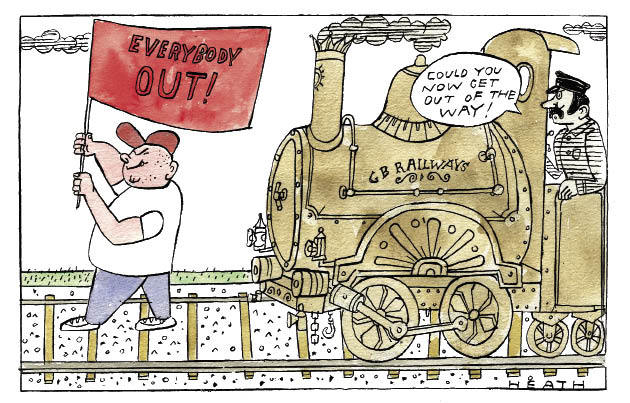The Queen agreed to a request from Mr Gordon Brown, the Prime Minister, to dissolve Parliament so that a general election might be held on 6 May. Mr Brown stood in Downing Street, surrounded by the Cabinet, including a woman with striking red hair, who turned out to be Lady Royall of Blaisdon, the leader of the House of Lords. He then went with a posse of outriders to catch a train to Ashford, Kent. On Monday, after the dissolution of Parliament, he will fly from the country, in order to take part in talks in New York about Iran’s nuclear programme. Mr David Cameron, the leader of the opposition, stood by the Thames for the cameras, surrounded by young party supporters, then went to Leeds. In the rush to get legislation through, the government allowed the 10p rise in duty on cider, introduced at the Budget, to lapse at the end of June unless revived by Parliament. A tax on land telephone lines, nominally to fund the spread of broadband, also fell. Party differences had already focused on National Insurance, after 23 business leaders, from companies including Marks & Spencer and Diageo, wrote to the Daily Telegraph in support of the Conservatives’ plan not to implement the 1 per cent increase announced by Labour for April 2011. Mr Brown proposed a surprising analogy with the injured ankle of Wayne Rooney, the footballer. ‘If we try and jump off the treatment table as if nothing had happened,’ he said, ‘we’ll do more damage to the economy.’ Mr David Miliband, the Foreign Secretary, and Mr Ed Miliband, the Energy Secretary, unveiled a poster depicting Mr David Cameron, the leader of the opposition, in the character of Gene Hunt, a popular fictional policeman on television.
The High Court blocked a four-day strike by railway signallers belonging to the National Union of Rail, Maritime and Transport Workers; Network Rail had told the court that in a strike ballot more votes than voters were cast in some places. The RMT set about organising another ballot. A remark by Mr Chris Grayling, the shadow home secretary, about bed and breakfast accommodation for homosexual couples, was secretly recorded: ‘If it’s a question of somebody who’s doing a B&B, that individual should have the right to decide who does and who doesn’t come into their own house,’ he said. Mr Chris Bryant, the Europe Minister, underwent a civil partnership ceremony, the first to be held in the Houses of Parliament. The seventh member since October resigned from the Advisory Council on the Misuse of Drugs after the Home Office announced that mephedrone will be classified as a Class B drug within a fortnight. Sir Alec Bedser, the bowler, died, aged 91. Corin Redgrave, the actor, died, aged 70. Thousands in Northern Ireland and Scotland spent days without electricity because of snowstorms.
Israeli aeroplanes bombed what it said were weapons factories in Gaza after a month in which more than 20 rockets or mortar bombs had landed on its territory. Two Israeli soldiers were killed last week at Khan Younis in Gaza. The Israeli military criticised its own soldiers for shooting dead four young Palestinians near Nablus last month. President Hamid Karzai blamed the United Nations for election fraud in Afghanistan. Pakistan’s main Taleban faction set off a bomb at the United States consulate in Peshawar, killing seven Pakistanis. The day before, 43 had died in a suicide bombing at a Pashtun nationalist rally 50 miles from Peshawar. Bombs in Baghdad killed 49. Maoist rebels killed at least 72 Indian soldiers in attacks on convoys in the state of Chhattisgarh. A British man and woman lost their appeal against a sentence of a month in jail for kissing in a restaurant in Dubai.
Eugene Terreblanche, the 69-year-old leader of the white-supremacist Afrikaner Weerstandsbeweging, was beaten to death in bed at his farm near Ventersdorp, in the North West province of South Africa. President Jacob Zuma called it a ‘cowardly’ murder. An explosion at the Upper Big Branch coalmine, near Charleston, West Virginia, killed 25. In China, 115 miners were rescued after a week trapped in a flooded coalmine at Wangjialing in Shanxi province; five bodies were found and another 33 men were missing. China threatened to halt imports of soya worth $2 billion from Argentina this year in retaliation against measures to curtail Chinese dumping of cheap textiles. A South Korean destroyer pursued the 300,000-tonne tanker Samho Dream with 1.5 million barrels of oil aboard, captured by Somali pirates in the Indian Ocean. Protestors seeking the government’s resignation blockaded shopping centres in Bangkok for several days running. Crowds protested against the government in Kyrgyzstan. Army officers in Guinea-Bissau detained the Prime Minister, Mr Carlos Gomes Junior, but then released him. CSH






Comments